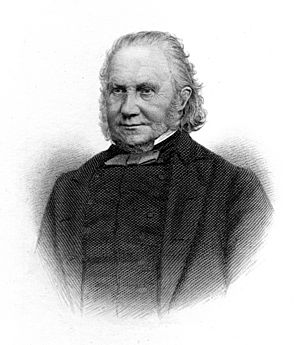Thomas Cooper (poet) facts for kids
Quick facts for kids
Thomas Cooper
|
|
|---|---|

Thomas Cooper
Engraving by John Cochran |
|
| Born | 20 March 1805 Leicester, England |
| Died | 12 July 1892 (aged 87) Lincoln, England |
| Language | English |
| Nationality | British |
| Genre | Poetry |
| Literary movement | Chartism |
Thomas Cooper (born March 20, 1805 – died July 15, 1892) was an English poet. He was also an important leader in a movement called Chartism. This movement worked for more rights for working people in Britain.
Cooper wrote a very long poem called Purgatory of ...s (1845). It has 944 stanzas, which are like verses. He also wrote novels and later in his life, religious books. Thomas Cooper taught himself everything he knew. He worked as a shoemaker, then a preacher, a schoolmaster, and a journalist. In 1840, he became involved with Chartism. People saw him as a very strong and determined person.
Contents
Early Life and Learning
Thomas Cooper was born in Leicester, England. His father worked as a dyer. After his father passed away, his mother started a business. She dyed fabrics and made fancy boxes in Gainsborough, Lincolnshire. Young Thomas became an apprentice to a shoemaker.
Even though life was hard, Thomas taught himself to read and write. He studied a lot on his own. By the time he was 23, he had been a shoemaker in Gainsborough. In 1827, he was able to open his own school there. In 1834, he moved to Lincoln. That same year, he married Susannah Chaloner. She was a cousin of the famous mathematician George Boole. Susannah passed away in 1880.
In Lincoln, Thomas joined the Lincoln Mechanics' Institute in 1834. This was a place where working people could learn. Soon after, he became part of the Institute's committee. He likely stayed on the committee until he left Lincoln in 1838.
Becoming a Chartist Leader
After working for newspapers in Lincoln and London, Thomas Cooper moved to Leicester in 1840. He joined the team at the Leicestershire Mercury newspaper. Under his leadership, Leicester became a strong center for the Chartist movement. They even had their own newspapers, like the Commonwealthman. They also had a school for adults.
Thomas became a key leader and speaker for the Chartists. In 1843, he was sent to prison in Stafford for two years. This happened after he encouraged some protests in the Staffordshire Potteries area in 1842. After he was released from prison, Cooper decided to stop being a full-time activist.
After leaving prison, Cooper worked to publish his writings. He caught the attention of important people like Benjamin Disraeli and Douglas Jerrold. With Jerrold's help, his work was published in 1845. After this, Cooper started giving talks about history and education.
Writing and Public Speaking
In 1850, while working on different newspapers, Cooper started his own paper called Cooper's Journal. However, only a few issues were printed. Around this time, he started to have some doubts about his religious beliefs. He held these sceptical views until 1855.
In 1855, he returned to Christianity and joined the Baptists. He became a preacher among them. According to his own life story, he publicly shared his renewed faith. This happened during a lecture in London on January 13, 1856. He then began to challenge people who had doubts about faith to debates.
Even though he still called himself a Chartist, he wanted to make a living as a writer. Besides his poems, he wrote several novels. However, books like Alderman Ralph (1853) were not very successful.
Although he had lost his religious beliefs for a time, Cooper spent the next 30 years defending Christianity. He spoke out against the evolutionary theories of scientists like Charles Darwin and Ernst Haeckel. In 1878, he wrote a book called Evolution, The Stone Book, and The Mosaic Record of Creation. In this book, he supported creationism and did not agree with evolution.
Thomas Cooper was a passionate, honest, and sincere man. His autobiography, written in 1872, is considered a classic book from the Victorian period. In his later years, he became known as an old-fashioned Radical. In 1867, his friends raised money to provide him with a regular income for life. In his last year, he also received a government pension. He passed away in Lincoln on July 15, 1892, and was buried there.
Thomas Cooper's Books
Here are some of the main books and writings by Thomas Cooper:
- Wise Saws and Modern Instances, London, 1845; he wrote this while in Stafford jail.
- Two Orations against Taking Away Human Life, 1846, about being against violence.
- The Baron's Yule Feast, London, 1846.
- Land for the Labourers, London, 1848.
- Captain Cobler: or, The Lincolnshire Rebellion : an historical romance of the reign of Henry VIII, London, 1850.
- Bridge of History over the Gulf of Time, London, 1871.
- Life of Thomas Cooper, written by Himself, London, 1872.
- Plain Pulpit Talk, London, 1872.
- God, the Soul, and a Future State, London, 1873.
- Paradise of Martyrs, London, 1873.
- Old-fashioned Stories, London, 1874. Also published in New York, 1893.
- Evolution, The Stone Book, and The Mosaic Record of Creation, London, 1878.
- Atonement, a second series of Plain Pulpit Talk, London, 1880.
- Thoughts at Four Score, London, 1885.
Cooper's collected Poetical Works were published in London in 1877.
 | Mary Eliza Mahoney |
 | Susie King Taylor |
 | Ida Gray |
 | Eliza Ann Grier |

